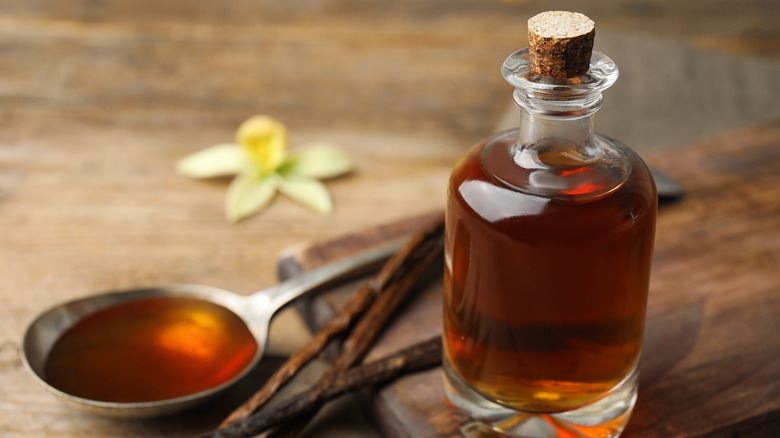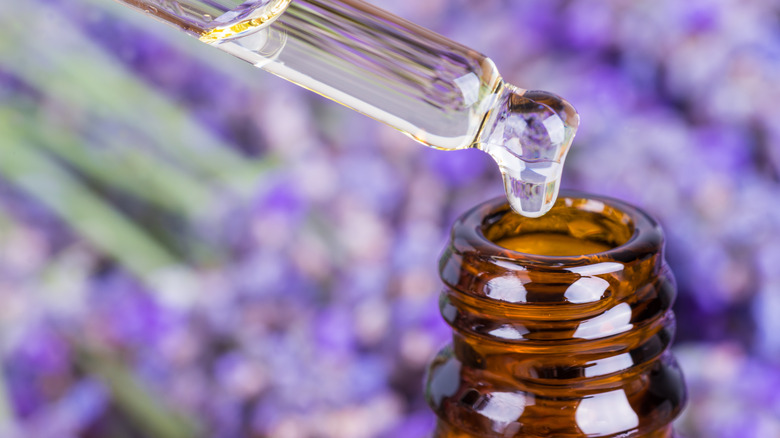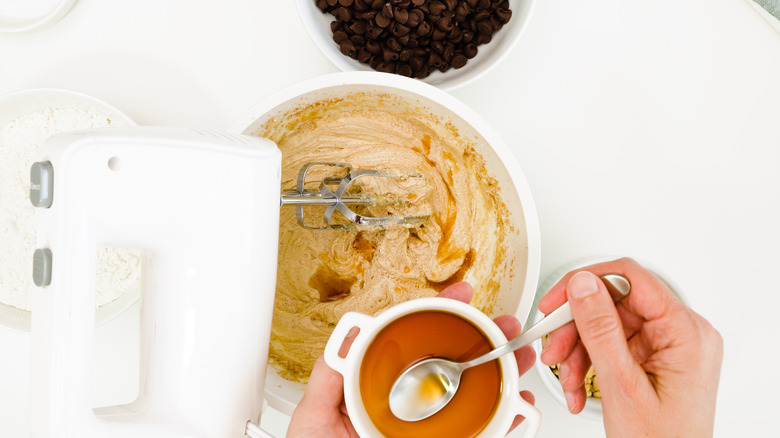Extracts Vs. Oils: What's The Difference When Baking?
Let's be honest, the best part of baking is the rich, lush flavors and warm delicious aromas that waft off of fresh, crusty bread and spongy layers of cake. Whether you prefer a warm and toasty spice cake during the autumn along with the smell of roasted apples and walnuts or a light and floral lavender and blueberry pavlova for a spring picnic, the best bakes in the world rely on the power of flavor. Too much flavor means your dessert becomes overwhelming in just a few bites, but too little and your food becomes bland and lackluster.
Finding the right kinds of flavors and adding the right amount is key to any successful bake, but what is the best way to add those desirable flavors into your food? Should you add the whole ingredients like mint, vanilla bean, or orange directly? Bickford Flavors states that some flavors are better achieved in your recipes without the help of flavor concentrates like oils, extracts, and powders. But the question then becomes, which should you use?
What are extracts?
Vanilla, almond, and peppermint extracts are what we are most familiar with in the kitchen. We use them to make recipes like Italian rainbow cookies, peppermint ice cream, and vanilla loaf cake. They are also notoriously expensive to buy from grocery stores. Extracts are often used to add nuanced flavor to your desserts and are easier to fold into your batter for flavor than actual almonds and peppermint and will hold the flavor much better during the baking process. McCormick extracts are used worldwide and are made by steeping the flavor from things like herbs, spices, nuts, and fruit in ethanol-based alcohol which slowly extracts the oils from the desired ingredients to make the flavors easily accessible in our kitchens.
There are different kinds of extracts such as "organic" which is made with organic ingredients and alcohol and "natural" which is non-artificially produced from plant material, but all extracts are super flavorful. Frontier Coop states that extracts can be extremely concentrated and pack a punch when they adhere to the FDA's guidelines which require extracts to contain 35% alcohol. So, a little extract goes a long way!
What are oils?
While extracts are made by being soaking an ingredient in alcohol until it has been fully infused, essential oils are physically squeezed from the ingredient itself without the use of ethanol. According to The Kitchn, oils are pure and highly concentrated, because they are directly pulled from the ingredients without being diluted.
Oils are not only used in baking but are also quite common in chopsticks, balms, and perfumes to create a truly aromatic experience. But because of the intensity of the oils, Nature's Flavors tells us that it is all too easy to overdo it and overwhelm your recipes. To avoid this, they suggest starting off small and tasting your mixture as you go but something to note is that if the flavor disappears from your taste buds after only a few seconds, add about 10% more of the oil prior to baking to make up for the flavor lost during the cooking process.
How they impact baking
Whether you've been baking for six months or six years you probably know by now that adjusting, adding, or removing any ingredient to your bake will affect how it turns out. And even though the extracts or oils you add to your bake may not seem like a big deal, adding too much or too little can either make your desserts sing with flavor or be disappointingly bland.
Pastries like a Pro claims that extracts and oils can be used to enhance everything from candies to cakes, but tend to be expensive to stock so most people traditionally keep the most popular flavor, vanilla, on hand. That being said, extracts are perfect for classic vanilla buttercreams and sweet bakes whereas oils (which survive under high heat) are fantastic for flavoring candies and chocolate.
While both oils and extracts are a welcome addition to the kitchens they obviously have their differences not just in how they are made, but in how they are best used. The Kitchn explains that when compared with oils, extracts -while intense themselves- are softer in flavor and aroma and are often used to create a base flavor that won't overwhelm the dish. So if you want a specific flavor to pack a punch they recommend using oils. But since there is such a dramatic difference in flavor power you must not replace oil with extracts in equal parts, instead for every 1 teaspoon of extract use 3 to 5 drops of oil and vice versa.
Whether you decide to use extracts or oils, just don't skip out on them entirely. Without these little drops of oil our desserts and tasty goodies certainly wouldn't taste so good.



